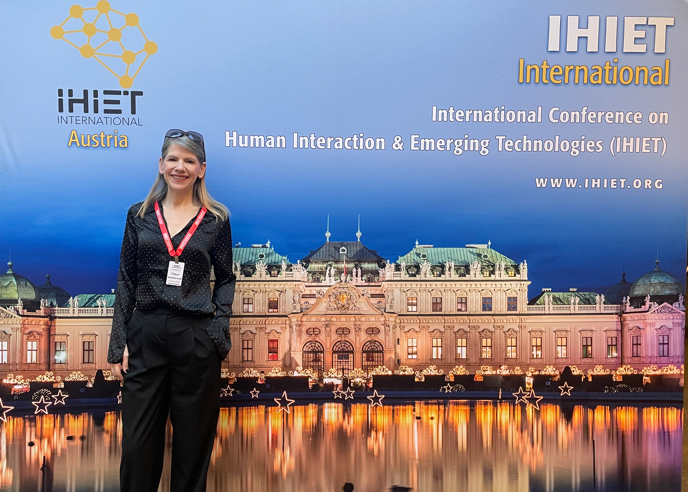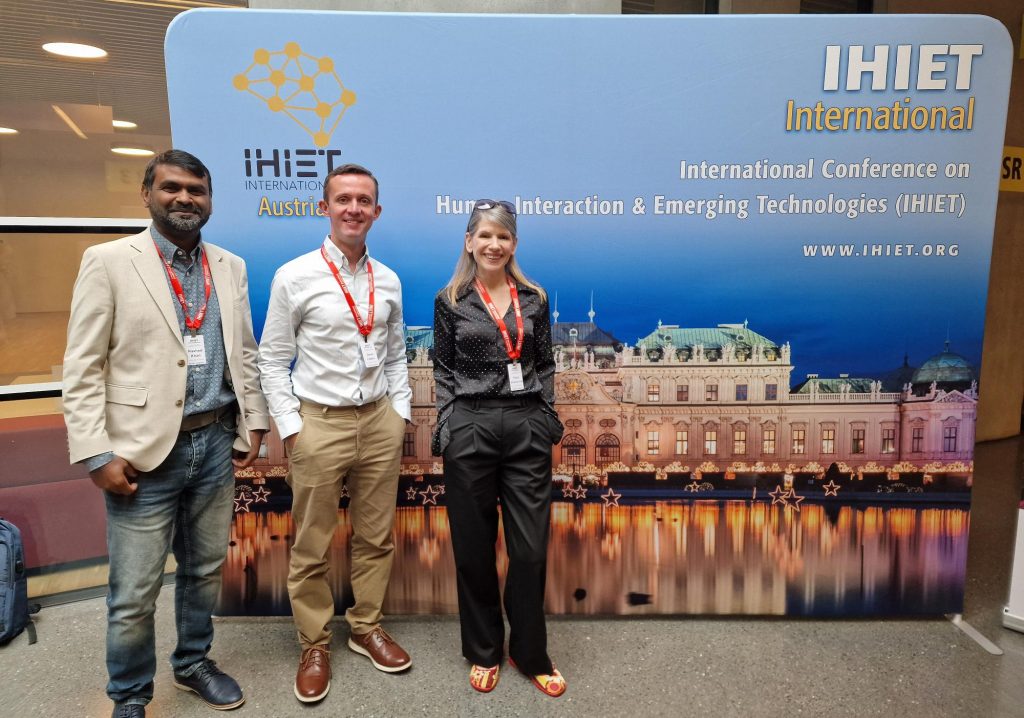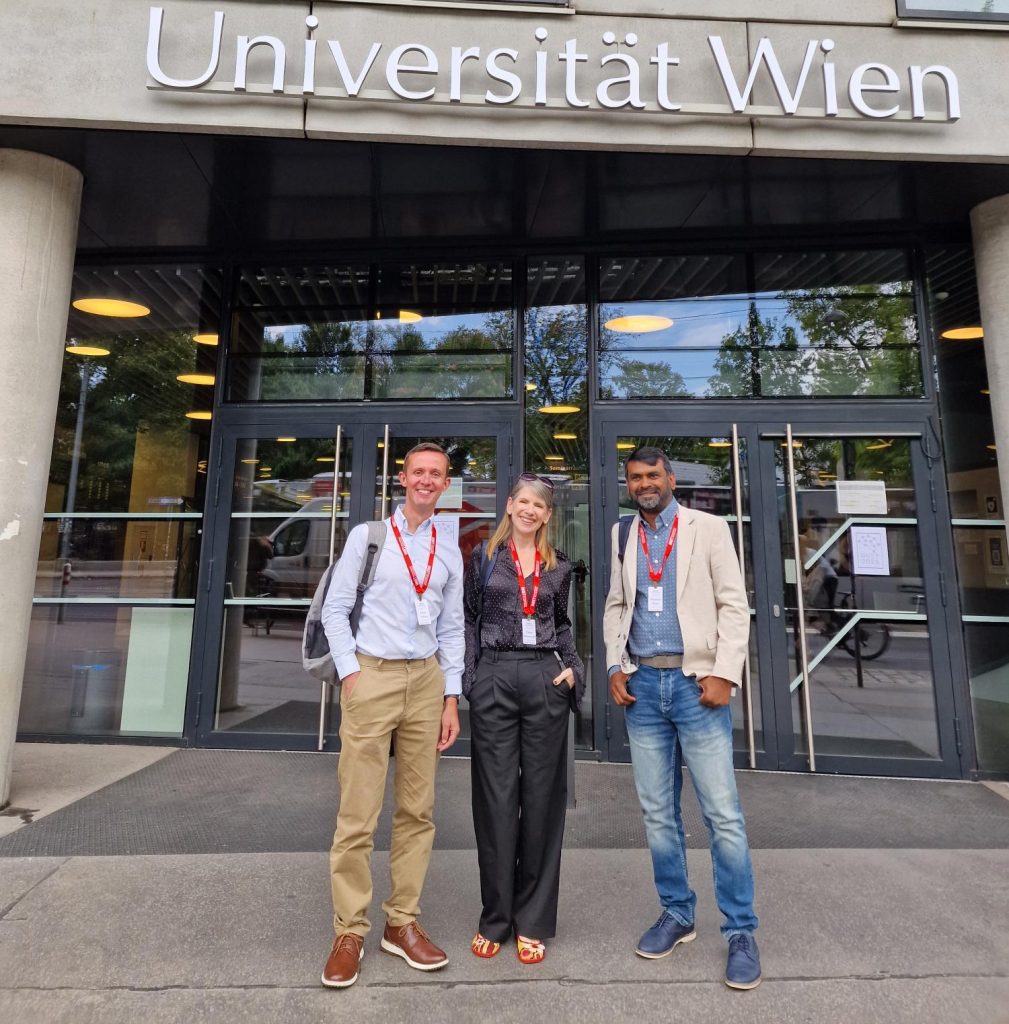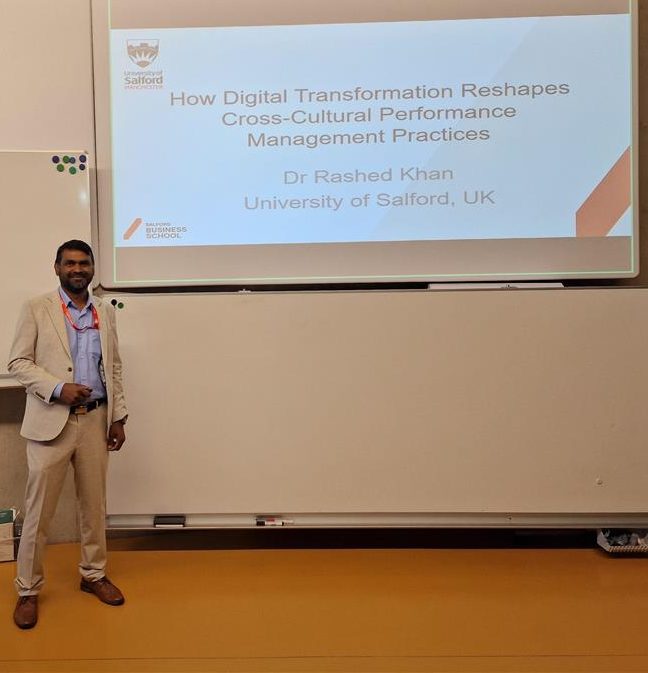The 15th International Conference on Human Interaction and Emerging Technologies (IHIET) 2025, held at the University of Vienna, Austria, brought together global experts to discuss innovations in artificial intelligence (AI), human-computer interaction, virtual and augmented reality (VR/AR), wearable technologies, and sustainable business practices.
Representing Salford Business School (SBS) were Fleur Middlebrough, Dave Fallon, and Dr Rashed Khan, who each presented research tackling key challenges at the intersection of sustainability, education, and digital transformation.
Green accounting practices: driving sustainable business growth
Fleur Middlebrough, Head of Accounting and Senior Lecturer, presented joint research with Dr Fateha Shaheen and Dr Rashed Khan on how green accounting – the integration of environmental costs into financial reporting – can drive both sustainability and profitability.
The research identifies how businesses can:
- Meet environmental reporting standards.
- Improve efficiency through resource and energy management.
- Build stronger brand trust and attract environmental, social, and governance (ESG)-focused investment.
- Differentiate themselves in sustainability-driven markets.

Case studies highlighted a consumer goods company that cut emissions by 30% and reduced water by 40%, and an electric vehicle manufacturer that boosted ESG investment by 15% through sustainable sourcing.
Yet barriers remain, particularly for SMEs, including high costs, inconsistent standards, and resistance to change. Fleur and colleagues propose solutions such as adopting global standards (e.g. GRI, ISO 14001), leveraging digital tools, and embedding ESG frameworks into strategy.
Fleur commented: “Green accounting is not just an environmental obligation but a strategic opportunity. By embedding sustainability into financial systems, businesses—especially SMEs—can unlock efficiency, attract investment, and secure long-term growth.”
Transforming accounting education in the age of AI
Dave Fallon, Director of Law, Economics, Accounting and Finance, shared research conducted with Dr Fateha Shaheen and Fleur Middlebrough, on how AI-driven technologies are transforming accounting education and helping bridge the digital skills gap.
The study highlighted a growing disconnect between traditional accounting curricula and the needs of the digital economy, where skills in data analytics, automation tools, and cognitive technologies are increasingly critical.
By analysing literature, case studies, and performance data, the team assessed the impact of intelligent learning systems (ILS), such as:
- Virtual tutors offering personalised guidance.
- Adapting learning environments that adjust to student progress.
- Real-time feedback tools that boost engagement and retention.
Institutions that adopted these technologies saw measurable improvements in student understanding, outcomes, and job readiness. At the same time, challenges such as faculty resistance, infrastructure gaps, and ethical questions around data use remain significant barriers.
The research concludes with strategic recommendations for educators, curriculum designers, and policymakers, emphasising the need to embed digital learning tools into accounting education to ensure graduates are AI-ready and capable of thriving in a rapidly changing profession.
Dave commented: “Salford Business School is at forefront of using ed-tech and intelligent learning systems to support our students’ learning, and presenting at this high profile conference was a great way to share the work we’ve been doing with colleagues from around the world and also to learn about what others are doing in this important area”


How digital transformation reshapes cross-cultural performance management practices
Dr Rashed Khan, MSc Management Programme Lead and Lecturer in International Business and Marketing, presented joint research with Dr Fateha Shaheen on how AI, data analytics, and digital human resource (HR) platforms are transforming traditional performance evaluations, reducing cultural bias, and fostering greater fairness and inclusivity in diverse workplaces.
Through a systematic literature review, Rashed highlighted both the benefits and challenges of these digital systems. While they enhance transparency and enable real-time feedback, issues such as digital literacy gaps, resistance to change, and cybersecurity risks remain important considerations.
A key outcome of this research is the introduction of the Culturally Aligned Digital Performance (CADP) Framework, which integrates digital enablement, justice mechanisms, and cultural accommodation to guide organisations in aligning technology with human and cultural needs.

This framework provides actionable insights for HR leaders, especially in multinational firms, to ensure digital systems not only drive efficiency but also uphold inclusivity.
Dr Rashed Khan added: “These conversations underscored the importance of developing digital strategies that balance innovation with cultural sensitivity – an agenda that SBS is proud to advance on the global stage.”